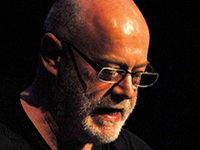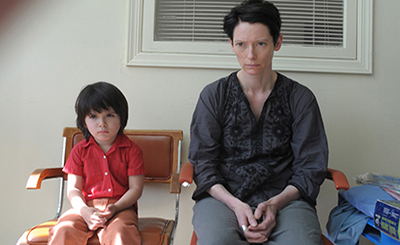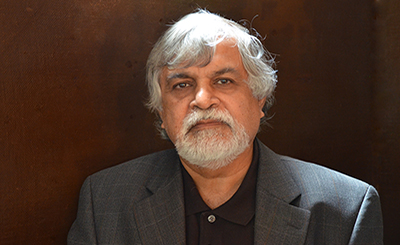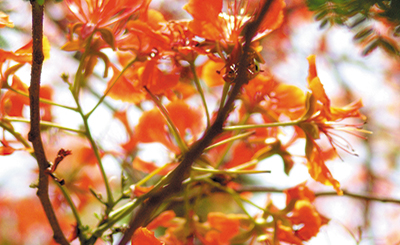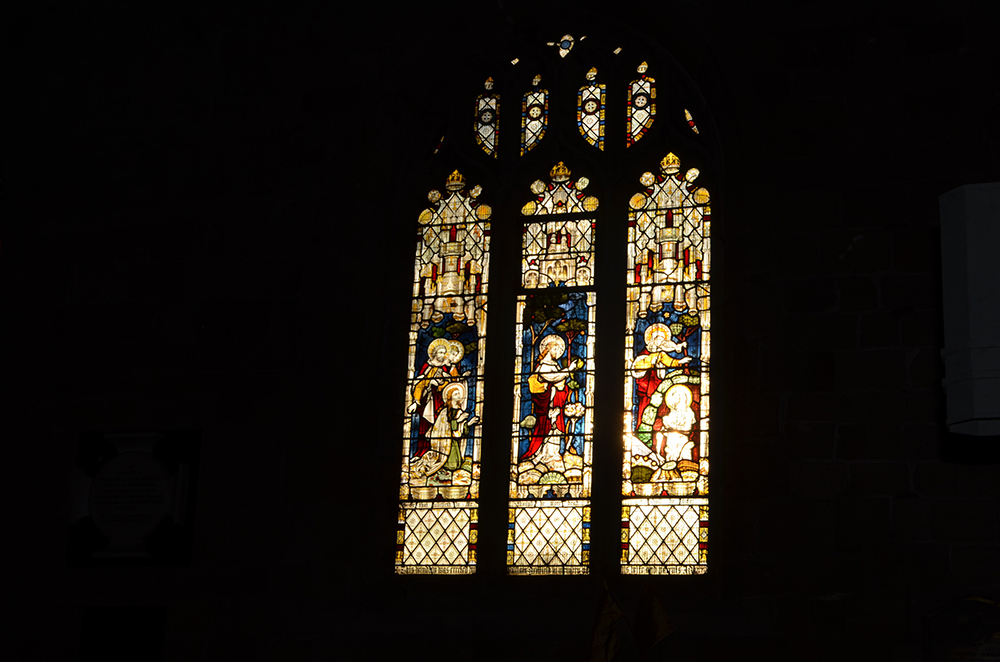
10 poems by British poet Ian Duhig, twice winner of National Poetry Competition, under World Poetry/Prose Portfolio [WPP], curated by Sudeep Sen
Darkly
Through the glass of his waterclock
Konrade of Megenberg reflected on
the weeping crocodiles of torchlight
that crawled across his window pane
then fell, the adulterers face-down,
liars on one side, three fingers raised
as if signalling the Sunday hymn ―
“Had it not been for our contrition
All Christendom had met perdition!”
What he mistook for rosaries were whips.
This plague is of promiscuous effect;
it cannot therefore be God’s work
he scratched in his ‘Book of Nature’.
“Mercy ye ne’er to others show
None shall ye find but endless woe!”
Some blame the Jews, which is illogic:
their Viennese dead put out the stars.
Our true light is the open mind.
The clock dipped. He put fists of aloe,
calamite and storax on the open fire.
Konrade thought, but did not write,
I would physic these wretched hale
with piss-a-bed for their wit’s cachexia.
“Post equitem sedet atra cura” ―
it’s Man hitches and burrs the saddle.
Here we spit Jewish moneylenders
while Cyprus burns its Arab slaves.
All waste the best that plague preserves
and herb true-love will not restore it,
nor hedge-mustard recover one lost voice.
I’r Hen Iaith A’i Chaneuon
If the tongue spoke only the mind’s truth,
there wouldn’t be any neighbours.
— The Red Book of Hergest
When I go down to Wales for the long bank holiday
to visit my wife’s grandfather, who is teetotal,
who is a non-smoker, who does not approve
of anyone who is not teetotal and a non-smoker,
when I go down to Wales for the long, long bank holiday
with my second wife to visit her grandfather,
who deserted Methodism for the Red Flag,
who won’t hear a word against Stalin,
who despite my oft-professed socialism
secretly believes I am still with the Pope’s legions,
receiving coded telegrams from the Vatican
specifying the dates, times and positions I should adopt
for political activity and sexual activity,
who in his ninetieth year took against boxing,
which was the only thing I could ever talk to him about,
when I visit my second wife’s surviving grandfather,
and when he listens to the football results in Welsh,
I will sometimes slip out to the pub.
I will sometimes slip out to the pub
and drink pint upon pint of that bilious whey
they serve there, where the muzak will invariably be
‘The Best of the Rhosllannerchrugog Male Voice Choir’
and I will get trapped by some brain donor from up the valley
who will really talk about “the language so strong and so beautiful
that has grown out of the ageless mountains,
that speech of wondrous beauty that our fathers wrought”,
who will chant to me in Welsh his epileptic verses
about Gruffydd ap Llywelyn and Dafydd ap Llywelyn,
and who will give me two solid hours of slaver
because I don’t speak Irish, and who will then bring up religion,
then I will tell him I know one Irish prayer about a Welsh king
on that very subject, and I will recite for him as follows:
‘Fág uaim do eaglais ghallda
Is do chreideamh gan bonn gan bhrí,
Mar gurb é is cloch bonn dóibh
Magairle Anraoi Rí.’ ‘Beautiful,’
he will say, as they all do, 'It sounds quite beautiful.’
NOTES:
The title is Welsh, and means ‘To the Old Tongue and its Songs’. The Irish is by Antoine Ó Reachtabhra, and translates roughly as “Away with your foreign religion,/And your baseless, meaningless faith,/For the only rock it is built upon/Is the bollocks of King Henry the Eighth.”
Straw School
Her parents love her huge brown eyes and how hard she works at school,
a school which cannot teach the pupils who have forgotten straw.
Her podgy fingers can trim the ‘chine to blanch and stiffen blades,
and she can shave each brimstoned rod into sixteen equal spills.
Her lips can wet a spill to soften it for working but leave no ring,
nor smudge the colours which have killed her once already.
She can plait Ivinghoe, Stanbride, Carrick Bend, Twist, Narrow Twist,
Egginton Twist, Barley, Double-Barley, Birdseye and Whipcord.
Lists are old-fashioned poems, but I catalogue the accomplishments
of Jenny Ibbens, dead by five a century ago, who still keeps dying.
Archbishop Mar Jacobus Remembers the Baron
Even the Syro-Chaldean bishopric I offered
on the strength of Hadrian VII
did not tempt Corvo. As mere Provost
to the Lieutenant of Grandmagistracy
of Sanctissima Sophia he fled
to Venice, convinced the Rhodes Trustees
were plotting his assassination.
Where else should provide a home
to the inventor of submarine photography?
I missed his inch-thick cigarettes,
gigantic Waterman fountain pens
and Graecocorvine vocabulary.
We played duets but kissed only once.
At last he denounced me as a fraud
and schismatic. I said he played the spinet
like a lobster trying to escape its pot –
after that, my overtures were useless.
For all his violence and absurdity
I warm to think of him now,
his cropped grey hair dyed with henna,
his white hand, wearing the spur-rowel ring
I gave him as defence against Jesuits
on the oar of his panther-skinned gondola
Flying the Bucintoro Rowing Club flag.
I think less of the lagoon-eyed fauns
he photographs and masturbates.
Does he think of me in Godless Middlesex,
where it either rains or they’re playing cricket?
The Syro-Chaldean Church is not doing well
despite my sigils, blazons, banners
and the undeniable splendour of our ritual.
The landlord’s wife is singing Auld Lang Syne.
This is going to be a Godless century.
Lumpenhund
My torturer’s hair smells of fallen leaves,
the times my family gathered acorns
for coffee. Evenings, I’d stalk the wharves
so my paper clothes would smell of copra,
my wooden shoes not sound like poverty.
One night I saw a shooting star
fall between the coamings on a steamer,
like a knot of kerosene-soaked oakum
falling from the hand of a saboteur.
To be on the safe side I joined them both.
My torturer’s eyes are blank as the eggs
(which must be a fresh clutch of wild hens’ eggs)
that transfer visa-stamps from one passport
to the next perfectly, if newly-boiled
and rolled warm on the feathery pages.
One night I saw a shooting star
tumble between the bars of a gutter,
like some crumpled poem with name on name
written in lemon juice between its lines.
Finally my left hand denounced my right.
My torturer’s hands are suppler
than the leather he soaks in egg-water
like a folk-cure, so he won’t catch my warts.
Sparks are falling from my hair. I’ve confessed
to everything but the hunger.
From the Plague Journal
I have been asked to write about our food.
I remember nights spent hulling ration-rice,
soya beans pressed dry before they got to us,
boiling black market sweetfish to hide their smell
from our Neighbourhood Monitor. We ate everything:
reed-root, pig-weed, tugwort, bar-weed ―
these may not be the scientific names.
We smuggled grated radish and bracken-sprouts
past our Neighbourhood Monitor once he started fainting,
propped beneath his Government banderoles:
‘There’s Always Space to Plant a Pumpkin!’
‘The War is Only Just Beginning!’
Later, our food became medicine:
dried fig-grubs for the incontinence;
ant-lions in sake for the headaches;
leek-leaves and cucumber for the burns.
I sold my son’s thousand-stitch belt
for peaches and eggs which I mashed and strained,
mashed and strained. Still my children died,
the last little Tadashi, setting his weasel-traps
of bamboo and abalone shells round the pond
he'd stocked with a few, tiny carp fry.
That is all I remember about our food.
Worm’s Turn
The lawn is the garden’s downfall. ― Ian Hamilton Finlay
Bombed on the lawn
by nitrogen fertiliser
a worm’s eye swims:
a snail rides its wave
like a Yankee frigate
at Flamborough Head.
Spring’s U-boat fleet
raises its periscopes
in flowerbed and field.
More green explosions
filmed as in time lapse
signal the ground war:
the garden’s tortoises
are German helmets
above green parapets;
its olive drab uniform
puts on, for the style,
epaulettes of woodlice.
The worm looks down:
its Michelin Man body
turns into a space-suit ―
in a war of new worlds,
the stag beetle’s antlers
are vulcanised ba’leths.
Past, present and future
churning out worm-food ―
The earth is carnivorous
says Ian Hamilton Finlay.
All flesh is grass says God.
Mmm! says the early bird
Gnostic Hymn
for William Blake
Sophia’s crime was giving birth;
they cast her out to walk the Earth
from here to there, both near and far
from Alpha through to Omega.
Their justice was a miscarriage,
but she remade with her own feet
the labyrinth of the Demiurge
as Wisdom’s light and heart and beat.
In that same maze where I’d been lost
Sophia now made me her guest;
full dissolution in her flesh
made mine, my mind and soul afresh.
The edgeland of Sophia’s tongue
is my home now, her face, its sky;
her hair gold as my childhood’s sun,
her eyes its lapis lazuli.
I see my future in those eyes,
she’ll show me when and where to go,
who knows more than our world can know,
who’s wise through being otherwise.
Croix-des-Bouquets, Haiti
Most were naked but for the locked tin masks
which stop them sucking the cane they harvest.
We could see they had been made tigerish
by their whippings. Our sabres stuck in bone,
our saddle-girths were slashed by their children,
crones tore shot from the mouths of primed cannon
while our powder-monkeys fumbled and wept.
But we have laid them up in lavender.
They think their dead will wake in Africa
Realm of the Coin
Sunk into a tray of well-mown velvet,
Offa looks strikingly like a Caesar,
or heads they chose to mean themselves.
His moneyers borrowed for the dinar —
the “Celtic pattern” a ringing Kufic:
‘Muhammad is the Prophet of Allah’.
The owner knows this but will not have it,
but can quote its value to the dollar.
More from The Byword
Comments
*Comments will be moderated



